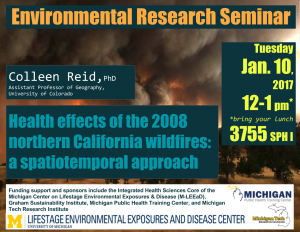Presented By: Center for Midlife Science
Environmental Research Seminar: Health effects of the 2008 northern California wildfires: a spatiotemporal approach
Colleen Reid, PhD (Assistant Professor of Geography, University of Colorado)

Abstract:
We investigated health effects associated with fine particulate matter during a long-lived, large wildfire complex in northern California in the summer of 2008. We estimated exposure to PM2.5 for each day using an exposure prediction model created through data-adaptive machine learning methods from a large set of spatiotemporal data sets. We then used Poisson generalized estimating equations to calculate the effect of exposure to 24-hour average PM2.5 on cardiovascular and respiratory hospitalizations and ED visits. We further assessed effect modification by sex, age, and area-level socioeconomic status (SES). We observed a linear increase in risk for asthma hospitalizations (RR=1.07, 95% CI=(1.05, 1.10) per 5 µg/m3 increase) and asthma ED visits (RR=1.06, 95% CI=(1.05, 1.07) per 5 µg/m3 increase) with increasing PM2.5 during the wildfires. ED visits for chronic obstructive pulmonary disease (COPD) were associated with PM2.5 during the fires (RR=1.02 (95% CI=(1.01, 1.04) per 5 µg/m3 increase) and this effect was significantly different from that found before the fires but not after. We did not find consistent effects of wildfire smoke on other health outcomes. The effect of PM2.5 during the wildfire period was more pronounced in women compared to men and in adults, ages 20–64, compared to children and adults 65 or older. We also found some effect modification by area-level median income for respiratory ED visits during the wildfires, with the highest effects observed in the ZIP codes with the lowest median income. Using a novel spatiotemporal exposure model, we found some evidence of differential susceptibility to exposure to wildfire smoke.
Short bio:
Colleen Reid’s research focuses on the interaction of environmental and social exposures on population health with a particular focus on the health impacts of exposures influenced by global climatic changes and society’s responses to those changes. Specifically, she has led research projects on the health impacts of the 2008 northern California wildfires, and the creation and evaluation of a national neighborhood-level map of vulnerability to extreme heat events. Trained in environmental epidemiology and spatial exposure assessment at the University of California, Berkeley, her post-doctoral training was in social epidemiology as a Robert Wood Johnson Foundation Health and Society Scholar at Harvard University. Dr. Reid is currently an assistant professor in Geography at the University of Colorado, Boulder.
We investigated health effects associated with fine particulate matter during a long-lived, large wildfire complex in northern California in the summer of 2008. We estimated exposure to PM2.5 for each day using an exposure prediction model created through data-adaptive machine learning methods from a large set of spatiotemporal data sets. We then used Poisson generalized estimating equations to calculate the effect of exposure to 24-hour average PM2.5 on cardiovascular and respiratory hospitalizations and ED visits. We further assessed effect modification by sex, age, and area-level socioeconomic status (SES). We observed a linear increase in risk for asthma hospitalizations (RR=1.07, 95% CI=(1.05, 1.10) per 5 µg/m3 increase) and asthma ED visits (RR=1.06, 95% CI=(1.05, 1.07) per 5 µg/m3 increase) with increasing PM2.5 during the wildfires. ED visits for chronic obstructive pulmonary disease (COPD) were associated with PM2.5 during the fires (RR=1.02 (95% CI=(1.01, 1.04) per 5 µg/m3 increase) and this effect was significantly different from that found before the fires but not after. We did not find consistent effects of wildfire smoke on other health outcomes. The effect of PM2.5 during the wildfire period was more pronounced in women compared to men and in adults, ages 20–64, compared to children and adults 65 or older. We also found some effect modification by area-level median income for respiratory ED visits during the wildfires, with the highest effects observed in the ZIP codes with the lowest median income. Using a novel spatiotemporal exposure model, we found some evidence of differential susceptibility to exposure to wildfire smoke.
Short bio:
Colleen Reid’s research focuses on the interaction of environmental and social exposures on population health with a particular focus on the health impacts of exposures influenced by global climatic changes and society’s responses to those changes. Specifically, she has led research projects on the health impacts of the 2008 northern California wildfires, and the creation and evaluation of a national neighborhood-level map of vulnerability to extreme heat events. Trained in environmental epidemiology and spatial exposure assessment at the University of California, Berkeley, her post-doctoral training was in social epidemiology as a Robert Wood Johnson Foundation Health and Society Scholar at Harvard University. Dr. Reid is currently an assistant professor in Geography at the University of Colorado, Boulder.